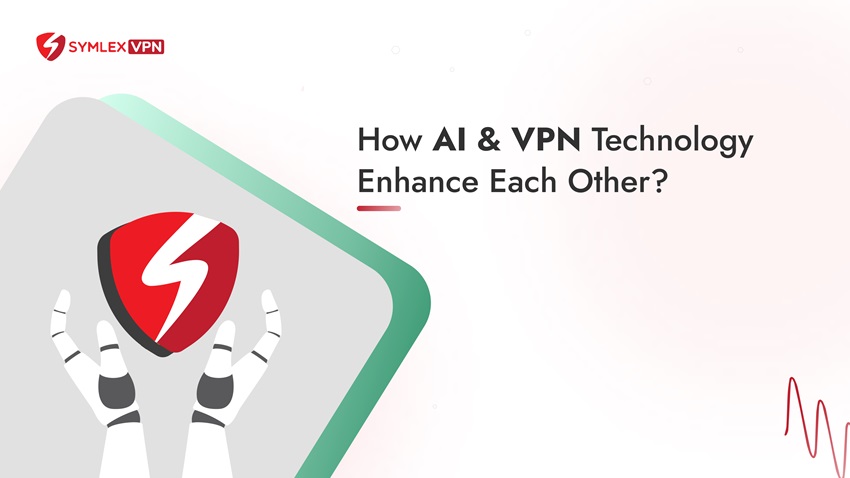
How Can AI In VPN Technology Enhance VPN Security?
- September 26, 2024
- 5 minutes Read
- Security & Privacy
Imagine a world where your VPN protects your online activities and adapts and evolves to defend against rising cyber threats proactively. That’s how AI-driven Enhancements supercharge your Virtual Private Network to fight against the latest threats developed by the most brilliant hackers.
This innovative concept is becoming a reality by integrating Artificial Intelligence (AI) into VPN technology. By harnessing AI capabilities, VPNs can predict, detect, and prevent potential security breaches. It can also reduce human errors and allow data-driven decisions without human intervention.
Today’s blog will explore how AI in VPN technology can enhance VPN security.
Table of contents
3 Ways AI In VPN Technology Enhances Your VPN
1. Advanced Threat Detection:
AI-based security can detect threats that traditional security methods cannot, providing better business protection. AI-based security systems can also respond quickly to new threats, providing greater security for businesses.
Thus, AI-powered security solutions analyze large volumes of network traffic and user behavior data, enabling them to identify subtle anomalies that may indicate new attacks, including zero-day vulnerabilities.
AI can automatically analyze vast amounts of code and network data to identify potential threats, allowing security analysts to focus on complex investigations and enhance efficiency. Additionally, AI can recognize patterns, indicating potential future attacks, allowing organizations to strengthen their defenses.
2. Automated Network Management:
AI monitors and manages network traffic efficiently. Benefits include reduced latency, improved connection stability, and optimized routing.
Integrating AI into VPN security frameworks enables automated responses to detected threats. When anomalies are identified, AI systems can trigger predefined actions, reducing the time needed to mitigate risks and enhancing security.
3. Enhanced Data Encryption:
AI can optimize encryption methods based on the type of data being transmitted.
By dynamically adjusting encryption protocols, AI ensures that sensitive information remains secure while maintaining optimal performance. This flexibility is vital for adapting to different threat levels and data types.
AI-based security systems can also provide greater visibility into a network, making it easier to detect and mitigate potential attacks. They can also provide real-time alerts, allowing businesses to respond to security threats quickly.
Case Studies: The Usage of AI in VPN Technology
1. Symlex VPN
Symlex VPN safeguards users against AI-driven threats, including advanced phishing attacks and data mining. It’s the first VPN provider to bring AI-driven Enhancements to the cybersecurity industry.
By obscuring users’ IP addresses and encrypting internet traffic, Symlex VPN prevents location-based phishing attempts that rely on users’ geographical information.
One user reported receiving a targeted phishing email intercepted by the VPN’s AI systems. It flagged the email as suspicious due to its analysis of previous attack patterns. The VPN then blocked the email and alerted the user, preventing them from potentially becoming a victim of the attack.
Image source: Windows report
2. Avast SecureLine VPN
Avast SecureLine VPN incorporates AI-driven threat detection capabilities that monitor real-time network traffic.
Users reported instances where the VPN successfully identified and blocked suspicious login attempts and data transmission patterns indicative of potential breaches. The AI system flagged these anomalies before any data loss occurred.
Image source: CNET
3. Express VPN
Express VPN uses machine learning algorithms to optimize server selection and enhance connection speeds while ensuring strong security.
Its AI-powered system dynamically adjusted encryption methods based on the type of data being transmitted to protect remote workers from the rise in cyberattacks.
This ensured that sensitive information would remain secure without sacrificing performance, preventing potential breaches during critical business operations.
Challenges and Limitations of AI in VPN Technology
Although implementing AI in VPNs is beneficial, it comes with potential challenges.
1. Complexity of Implementation
Integrating AI into VPN systems can be complex and resource-intensive. Organizations may struggle to deploy machine learning algorithms and properly configure them to analyze network traffic effectively.
This complexity can lead to increased operational costs and require specialized expertise that may need to be more readily available within the organization.
2. False Positives and Negatives
AI-based threat detection systems can generate false positives, where harmless activities are mistakenly identified as malicious. Also, they can produce false negatives, failing to detect genuine threats.
A high rate of false positives can overwhelm security teams and lead to alert fatigue, while false negatives can leave networks vulnerable to attacks. Achieving a balance between sensitivity and specificity in AI algorithms presents a significant challenge.
3. Data Privacy Concerns
The integration of AI in VPNs typically necessitates access to significant amounts of user data for algorithm training. This creates privacy concerns, as sensitive information may be exposed or misused if not managed correctly.
Organizations must also comply with regulatory frameworks like GDPR, which enforce stringent data collection and processing guidelines.
Closing Thoughts
We hope now you know how AI in VPN technology can enhance VPN security. Integrating AI in VPN security significantly advances the fight against cybercrime. As users depend on VPNs to safeguard their online activities, developing AI-powered security measures for VPNs will be crucial for ensuring a safe digital environment.
FAQs
Are AI-powered VPNs safe to use?
Yes, AI-powered VPNs are much safer and stronger than normal ones. It offers stronger threat prevention, intelligent server optimization, and improved privacy and security.
What are some AI-driven threats?
Some popular and rising AI-driven threats are Advanced phishing attacks, deep fake technologies, automated malware creation, and eavesdropping attacks.
How is AI in VPN useful in privacy and data security?
AI can be used to minimize security and privacy risks by encrypting personal data, reducing human error, and detecting potential cybersecurity incidents before they occur.
![Ultimate White Label VPN Business Guide 2026 [Cost & ROI]](https://symlexvpn.com/wp-content/uploads/2026/01/Ultimate-White-Label-VPN-Business-Guide-2025-Cost-ROI_2-376x114.webp)




